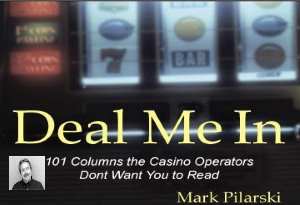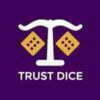Are there any secrets to winning at blackjack? Craig S.
Secrets, Craig? Yes, and one that’s been around for almost five decades: Counting cards.
Counting cards is nothing more than wagering more money when the cards remaining in the deck are rich in tens and aces. What counting cards does, Craig, is to establish mathematically the degree to which the as-yet-undealt deck favors either the player or the dealer by tracking the changing imbalance of big to little cards in the diminishing deck.
A deck that has previously dealt a bunch of low cards and is now rich with high cards (10, jack, queen, king, ace) favors the player, while the reverse, an excess of low cards remaining (2, 3, 4, 5, 6) favors the dealer.
At your kitchen table, Craig, with a shuffled deck of cards, try this one-level count system called Hi-Lo. At the outset, assign the following count values to each card.
2, 3, 4, 5, 6 (small cards)….+1
7, 8, 9 (neutral cards)….. 0
10, J, Q, K, Ace (big cards)….-1
With a starting figure of zero, slowly peel off one card at a time, adding to, or subtracting from, the constantly shifting figure as each card’s value changes it.
On a live game, you would factor in possible discards, then vary your bets from one hand to the next, guided by the constantly updated imbalance figure, which predicts whether the next hand will favor you or favor the dealer.
Card counters, in theory, have an advantage varying between 0.5% and 1.5% over the casino on a hand held or shoe game. If you are playing at a casino that offers only continuous shuffling machines, you gain absolutely NO advantage by counting.
What do you think of a betting strategy where you make one single even money, 50/50 bet like a pass line bet in craps, instead of trying to grind it out a few dollars at a time? If I lose, I’m done for the day and I’ll just hit the buffet, but if I win, I’ve doubled my money and I go home a guaranteed winner. Charlie H.
Putting the fun factor of what you want to do aside, your betting strategy is sound provided you have a 50/50 chance of doubling your money, but with a pass line bet, it’s not quite 50/50. The house still holds a 1.4% edge against your play.
I’ll agree, Charlie, that you are much more likely to double your money with just one single bet than by trying to do it a few bucks at a time. The more time you spend on a dice game, the better the casino’s fat and happy chances of grinding away at your bankroll, no matter how small your bets are.
A mathematician named Jess Marcum illustrated this back in 1980 when he figured out how time affects gambler odds. He figured that a player who bets $1 per crap game for two months straight would have only one chance in two trillion of winning $1,000, before he lost that same $1,000. But by decreasing his exposure on the craps game to just 25 minutes and betting $200 every bet, the same gambler would increase his odds to 1.15 to 1.
Conversely, with a single bet there is no way of minimizing your losses. One loss, and adios Charlie. What’s more, what about all the time, money and energy expended just to get to the casino to lay down a single wager. You’ll spend more time valet parking your car than you would making one pass line bet.
If you do choose an “all or nothing” approach, it sure would be a lot easier, and cheaper, to drive to the nearest convenience store and pick up some Twinkies, chocolate milk and a lottery ticket.
Gambling Wisdom of the Week: “Nobody wins all the time…Gee, I wish I was nobody.” –VP Pappy




















